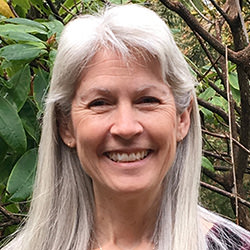

Search Results: consciousness
-
So many of us have a habitual response of trying to eliminate uncertainty and the arrival of what we don't want. Alternatively, we can embrace the irreducible uncertainty of life. This shift from resistance and helplessness to mourning allows acceptance of outcomes, reduction of stress, and opens the door to noticing and appreciating what's present and available amidst challenges.
-
Feelings and Needs form the cornerstone of Nonviolent Communication (NVC), offering a profound framework for cultivating empathy, compassion, and authenticity in our interactions. This comprehensive 9-page Feelings and Needs Reference Guide is designed to support you in integrating these vital concepts into your daily life.
-
Feelings and Needs form the cornerstone of Nonviolent Communication (NVC), offering a profound framework for cultivating empathy, compassion, and authenticity in our interactions. This comprehensive 9-page Feelings and Needs Reference Guide is designed to support you in integrating these vital concepts into your daily life.
-
Have you ever noticed how being heard in a deep, empathic way is like magic?
When we're deeply heard, our whole bodies relax. We return to equilibrium, we can breathe again, and access renewed curiosity, empowerment and choice. We also get a fresh perspective and new insights: like a fog lifting, we see ideas and solutions that evaded us before. And with that restored vision, we're able to find new ways to engage with others that, just moments earlier, seemed impossible or a chore.
You can become an empathy wizard—with anyone, in any situation, including the most challenging!
Join Dian Killian to explore key concepts and practices, including new ways of seeing and practicing NVC, and learn all this through direct experience, via exercises, pair work, and role play.
-
- Discover what is yours to do in response to our growing global crises
- Weave nonviolence more deeply into how you live and lead
- Receive ongoing support within and beyond the course in how to be effective and alive while doing what’s yours to do
- Increase your capacity to face and mourn current reality as a source of greater choice and energy
- Be a part of transforming the legacy of scarcity, separation, and powerlessness into a livable future
-
- Discover the healing magic that comes from welcoming pain rather than avoiding it
- Learn how to navigate ‘healing dialogues’ when hurt or pain is present
- Increase your empathy/honesty skills and your ability to navigate painful conversations
- Embrace pain as a precious life-guiding force that teaches us how to be together!
-
-
- Hear from four respected NVC trainers offering heartfelt insights and real-life strategies
- Connect with others seeking compassion, courage, and meaningful action
- Attend as a gift — pay what you can to support NVC Academy
- Discover simple, practical tools to stay grounded, clear, and empowered—no matter what’s happening in the world!
-
Yoram Mosenzon explores the core NVC principle that others do not cause our feelings—our interpretations and unmet needs do.
-
- Do you know what is yours to do in response to our growing global crises?
- Is nonviolence woven as deeply as you want it into how you live and lead?
- Have you ever experienced what it’s like to participate in an interdependent web of mutual support to fully embody our commitments?
- Are you familiar with how to bring yourself back again and again to aligning with purpose in every moment?
- Do you see yourself as part of transforming the legacy of scarcity, separation, and powerlessness into a livable future?
-
- Gain a deeper understanding of trauma through the lens of NVC
- Learn how to connect with ALL needs, even when we’ve been taught to suppress some of them
- Grow capacity to creatively move towards our deepest longings interdependently
- Discover how you can call people back to life when they are in the thick of patterned behavior
-
-
Here's a five-step 30 day practice to cultivate gratitude, using the practice of observations, needs, feelings, presence, vitality, awareness of contribution, sharing power and interdependence.
-
Jim and Jori share their work integrating Martin Seligman's work on Positive Psychology with Nonviolent Communication in a system they call REMAP, focusing on relationships, engagement, meaning, accomplishment and positivity.
-
How many times do we fall into the same hole, hit the same wall, get entangled into the same patterns? There seem to be hidden forces within us that keep unconsciously leading us, again and again, into the same melody of our lives. In this session, we will try to see our life-journey as a whole and rehabilitate our capacity to be in this existence of ours more directly and fully.
-
Reveal, own and share the inner chatter that plays over and over in your head, in between the words you speak aloud. Arnina Kashtan will help you discover, embrace and open up the places inside that you’ve hidden and judged.
-
Join Eric Bowers in transforming past relationship pain, coming alive in community and creating thriving relationships. This 12 session Telecourse recording brings together Eric's passions for Nonviolent Communication, Attachment Theory and Interpersonal Neurobiology.
-
- Look at your old patterns with warmth – while also opening yourself up to change.
- Increase your self-compassion – and gain a solid ground to stand on.
- Become intimate with your own survival strategies – and those of the people you love.
- Support healing and connecting in your long-term relationships – even when it seems there is no resolution in sight!
-
In a workshop, a hesitant white neurodivergent man faced a triggering reaction from a Global Majority transgender man. Uncovering their backgrounds, the facilitator addressed family dynamics and exclusion. A repair exercise fostered empathy, challenging assumptions and emphasizing the importance of equitable facilitation for a richer group experience.
-
How do our nervous systems sync during connection, and what happens when disconnection occurs? In this Sarah Peyton video, we explore the profound interdependence of human relationships through the lens of Nonviolent Communication (NVC).

Quick Links
Subscription Preferences
Stay In Touch!
Looking for ways to keep up with NVC Academy news, get special offers, free resources, or words of inspiration? Here are five ways to stay engaged:


















